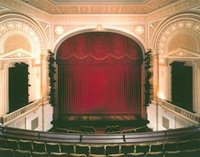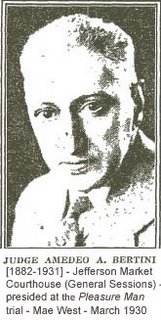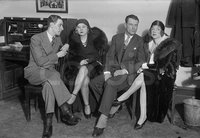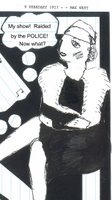Mae West: # 15,929
The play COURTING MAE WEST, based on true events in the life of MAE WEST (during 1926-1932), dramatizes her difficulties and legal woes. Here's some background on the raid on West 47th Street at the Biltmore Theatre on 1 October 1928, and Mae West's arrest shortly after midnight.

• • In 1860 the New York City Police Department built a station house at 345 West 47th Street, and an inexpensive-looking residence was erected in the adjacent lot. [Homeless men and women were offered bare-bones shelter there temporarily, and these deplorable conditions were famously exposed by photographer Jacob Riis.] Due to its location in Hell’s Kitchen and proximity to the theater district, the station house remained very busy.
• • Mae West was brought here when arrested for her 1928 play: "Pleasure Man."
• • New York Times scribe Meyer Berger gave readers a look at that block and Mae's misadventure in his book The Eight Million – Journal of a New York Correspondent [NY: Columbia University Press, 1983]. Here's an excerpt from his chapter WEST SIDE: That Was West Forty-seventh.
• • The war [1917-18] and the advent of Prohibition, wrote Meyer Berger, was a "mad combination that left West Forty-seventh frenzied and breathless. Theaters and night clubs, subways, ever-increasing motor traffic, homicidal bootleggers and drug addicts, beggars and peddlers, overran the precinct. Night encroached on day with the glare of millions of electric lights. West Forty-seventh was never out of the public prints. Men and women read about it in far-off countries and came to stare at its wretched bulk. After the war the pace grew dizzier and dizzier. Offenders against the law, piddling fellows and arrogant gang leaders, bootblacks and men like Legs Diamond and Dutch Schultz, crossed its worn threshold in ceaseless parade."
• • According to Meyer Berger, "Just after midnight on October 2, 1928, the big desk room was cluttered with fifty-five actresses and mincing male players from the cast of Pleasure Man, being booked for 'participating in an indecent performance at the Biltmore Theatre, 259-263 West Forty-seventh Street,' when the door swung to admit a large, self-assertive woman, generously curved and making the most of it. When she identified herself to the desk lieutenant, he took up his pen again, in cramped fingers, and wrote in the blotter, 'Arrest 15,929, Mae West, Hotel Harding, West Fifty-fourth Street, White, Single, U. S., authoress,' and booked her on the same charge. A footnote shows she was 'bailed by S. Silverman, $500 on Home and Lot, value $23,000, 708 Quincy Street, Brooklyn.' . . ."
• • With the development of new midtown police facilities in the 1960s, the West 47th Street police station — — known to Mae West as the 16th precinct — — was demolished.
________________________________________________________________
Source:http://courtingmaewest.blogspot.com/atom.xml

Courting Mae West
Mae West
• • Illustration • • Biltmore Theatre • • Mae West's play was raided • • 1928 • •
NYC
Mae West.


• • In 1860 the New York City Police Department built a station house at 345 West 47th Street, and an inexpensive-looking residence was erected in the adjacent lot. [Homeless men and women were offered bare-bones shelter there temporarily, and these deplorable conditions were famously exposed by photographer Jacob Riis.] Due to its location in Hell’s Kitchen and proximity to the theater district, the station house remained very busy.
• • Mae West was brought here when arrested for her 1928 play: "Pleasure Man."
• • New York Times scribe Meyer Berger gave readers a look at that block and Mae's misadventure in his book The Eight Million – Journal of a New York Correspondent [NY: Columbia University Press, 1983]. Here's an excerpt from his chapter WEST SIDE: That Was West Forty-seventh.
• • The war [1917-18] and the advent of Prohibition, wrote Meyer Berger, was a "mad combination that left West Forty-seventh frenzied and breathless. Theaters and night clubs, subways, ever-increasing motor traffic, homicidal bootleggers and drug addicts, beggars and peddlers, overran the precinct. Night encroached on day with the glare of millions of electric lights. West Forty-seventh was never out of the public prints. Men and women read about it in far-off countries and came to stare at its wretched bulk. After the war the pace grew dizzier and dizzier. Offenders against the law, piddling fellows and arrogant gang leaders, bootblacks and men like Legs Diamond and Dutch Schultz, crossed its worn threshold in ceaseless parade."
• • According to Meyer Berger, "Just after midnight on October 2, 1928, the big desk room was cluttered with fifty-five actresses and mincing male players from the cast of Pleasure Man, being booked for 'participating in an indecent performance at the Biltmore Theatre, 259-263 West Forty-seventh Street,' when the door swung to admit a large, self-assertive woman, generously curved and making the most of it. When she identified herself to the desk lieutenant, he took up his pen again, in cramped fingers, and wrote in the blotter, 'Arrest 15,929, Mae West, Hotel Harding, West Fifty-fourth Street, White, Single, U. S., authoress,' and booked her on the same charge. A footnote shows she was 'bailed by S. Silverman, $500 on Home and Lot, value $23,000, 708 Quincy Street, Brooklyn.' . . ."
• • With the development of new midtown police facilities in the 1960s, the West 47th Street police station — — known to Mae West as the 16th precinct — — was demolished.
________________________________________________________________
Source:http://courtingmaewest.blogspot.com/atom.xml
Courting Mae West
Mae West
• • Illustration • • Biltmore Theatre • • Mae West's play was raided • • 1928 • •
NYC
Mae West.

Labels: 10036, 1928, Biltmore Theatre, Broadway, Mae West, New York, NYC, West 47th Street




